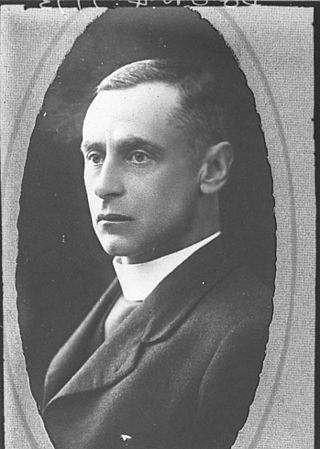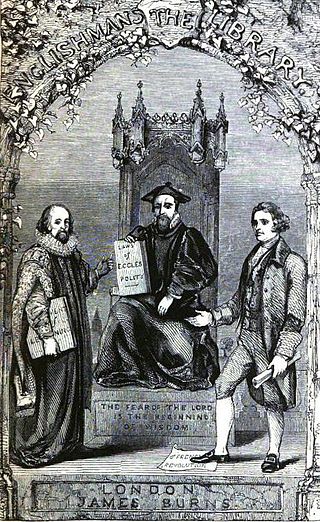Related Research Articles

John Henry Newman was an English theologian, academic, intellectual, philosopher, polymath, historian, writer, scholar and poet, first as an Anglican priest and later as a Catholic priest and cardinal, who was an important and controversial figure in the religious history of England in the 19th century. He was known nationally by the mid-1830s, and was canonised as a saint in the Catholic Church in 2019.

John Keble was an English Anglican priest and poet who was one of the leaders of the Oxford Movement. Keble College, Oxford, was named after him.

Edward Bouverie Pusey was an English Anglican cleric, for more than fifty years Regius Professor of Hebrew at the University of Oxford. He was one of the leading figures in the Oxford Movement, with interest in sacramental theology and typology.

Henry Edward Manning was an English prelate of the Catholic Church, and the second Archbishop of Westminster from 1865 until his death in 1892. He was ordained in the Church of England as a young man, but converted to Catholicism in the aftermath of the Gorham judgement.

The Oxford Movement was a movement of high church members of the Church of England which began in the 1830s and eventually developed into Anglo-Catholicism. The movement, whose original devotees were mostly associated with the University of Oxford, argued for the reinstatement of some older Christian traditions of faith and their inclusion into Anglican liturgy and theology. They thought of Anglicanism as one of three branches of the "one, holy, catholic, and apostolic" Christian church. Many key participants subsequently converted to Roman Catholicism.
The Oxford Book of English Verse, 1250–1900 is an anthology of English poetry, edited by Arthur Quiller-Couch, that had a very substantial influence on popular taste and perception of poetry for at least a generation. It was published by Oxford University Press in 1900; in its india-paper form it was carried widely around the British Empire and in war as a 'knapsack book'. It sold close to 500,000 copies in its first edition. In 1939, the editor revised it, deleting several poems that he regretted including and adding instead many poems published before 1901 as well as poems published up to 1918. The second edition is now available online.
These are Oxford poetry anthologies of English poetry, which select from a given period. See also The Oxford Book of Twentieth Century English Verse and Eighteenth century women poets: an Oxford anthology.
Several anthologies of religious poetry have been published by Oxford University Press.
Richard Hurrell Froude was an Anglican priest and an early leader of the Oxford Movement.

The Bampton Lectures at the University of Oxford, England, were founded by a bequest of John Bampton. They have taken place since 1780.
William Henry Bliss was an English scholar and Anglican convert to Catholicism.
Nationality words link to articles with information on the nation's poetry or literature.
The Library of the Fathers, more properly A library of fathers of the holy Catholic church: anterior to the division of the East and West, was a series of around 50 volumes of the Church Fathers, annotated in English translation, published 1838 to 1881 by John Henry Parker. Edited by Edward Bouverie Pusey and others including John Keble and John Henry Newman, this series of editions is closely associated with the origins of the Oxford Movement.
Arthur West Haddan was an English churchman and academic, of High Church Anglican views, now remembered as an ecclesiastical historian, particularly for Councils and Ecclesiastical Documents relating to Great Britain and Ireland, written with William Stubbs.
Edward Churton was an English churchman and Spanish scholar.
The Tracts for the Times were a series of 90 theological publications, varying in length from a few pages to book-length, produced by members of the English Oxford Movement, an Anglo-Catholic revival group, from 1833 to 1841. There were about a dozen authors, including Oxford Movement leaders John Keble, John Henry Newman and Edward Bouverie Pusey, with Newman taking the initiative in the series, and making the largest contribution. With the wide distribution associated with the tract form, and a price in pennies, the Tracts succeeded in drawing attention to the views of the Oxford Movement on points of doctrine, but also to its overall approach, to the extent that Tractarian became a synonym for supporter of the movement.
Charles Page Eden (1807–1885) was an English clerical author and editor, associated with the Tractarians.
William Scott (1813–1872) was an English clergyman, a leading High Church figure of his time.

The Englishman's Library was an English book series of the 1840s, a venture of the publisher James Burns. It ran eventually to 31 volumes.
Albany James Christie was an English academic and Jesuit priest.
References
- ↑ Arthur Middleton, Fathers and Anglicans (2004), p. 281.
- ↑ "Archived copy". oahs.org.uk. Archived from the original on 14 June 2007. Retrieved 17 January 2022.
{{cite web}}: CS1 maint: archived copy as title (link) - ↑ Peter Benedict Nockles, The Oxford Movement in Context (1997), p. 128.
- ↑ Newman and the English Theologians, Philip C. Rule
- ↑ Frank M. Turner (2002). John Henry Newman: The Challenge to Evangelical Religion . Yale University Press. pp. 357–8. ISBN 978-0-300-17309-3.
- ↑ Cowie, Leonard W. "Beveridge, William". Oxford Dictionary of National Biography (online ed.). Oxford University Press. doi:10.1093/ref:odnb/2321.(Subscription or UK public library membership required.)
- ↑ "Outlines of the History of the Theological Literature of the Church of England (1897)". Anglicanhistory.org. Retrieved 1 September 2012.
- ↑ . Dictionary of National Biography . London: Smith, Elder & Co. 1885–1900.
- ↑ . Dictionary of National Biography . London: Smith, Elder & Co. 1885–1900.
- ↑ Charles Stephen Dessain, Ian Turnbull Ker, Gerard Tracey, Thomas Gornall, The Letters and Diaries of John Henry Newman Vol. 8 (1999), Appendix 2 p. 521.